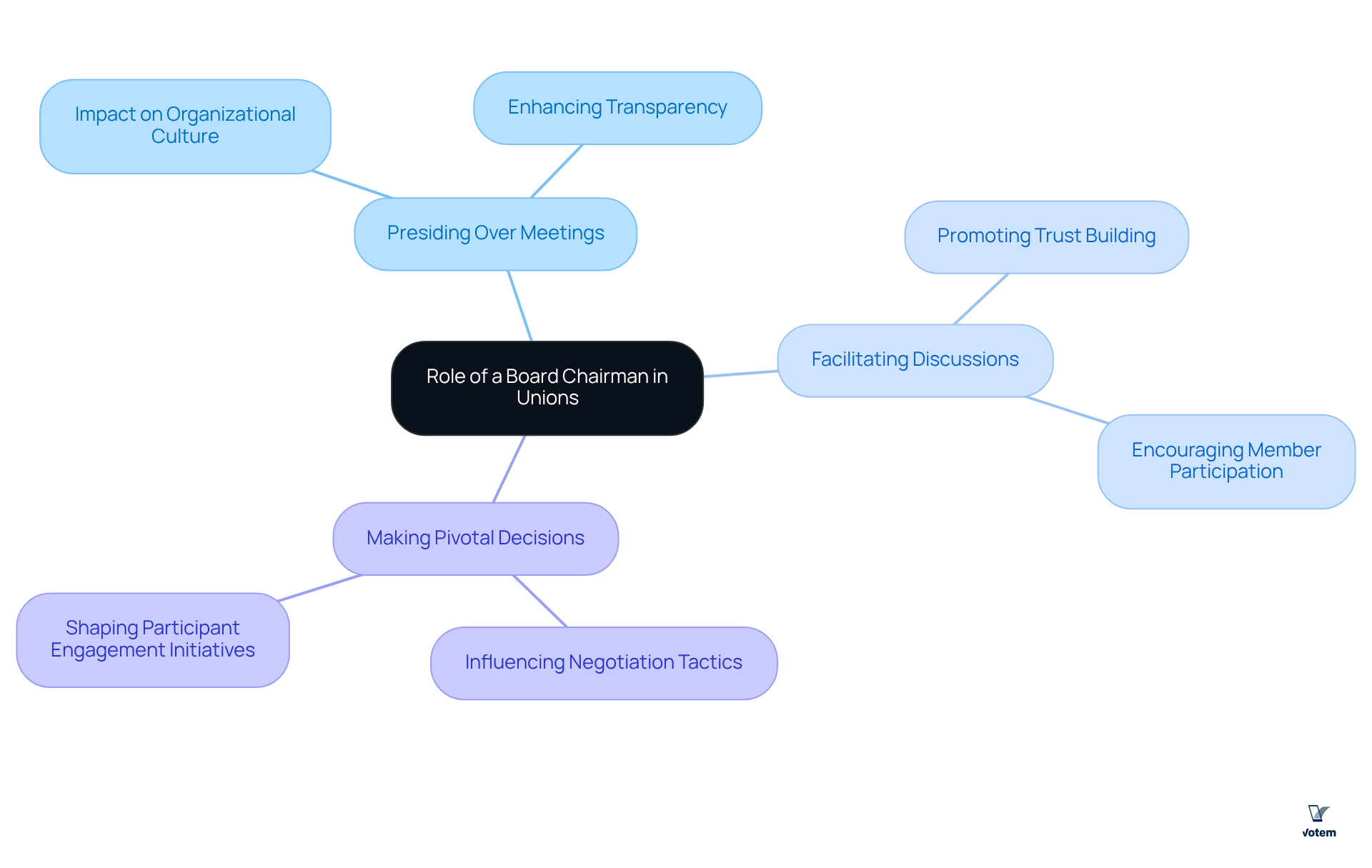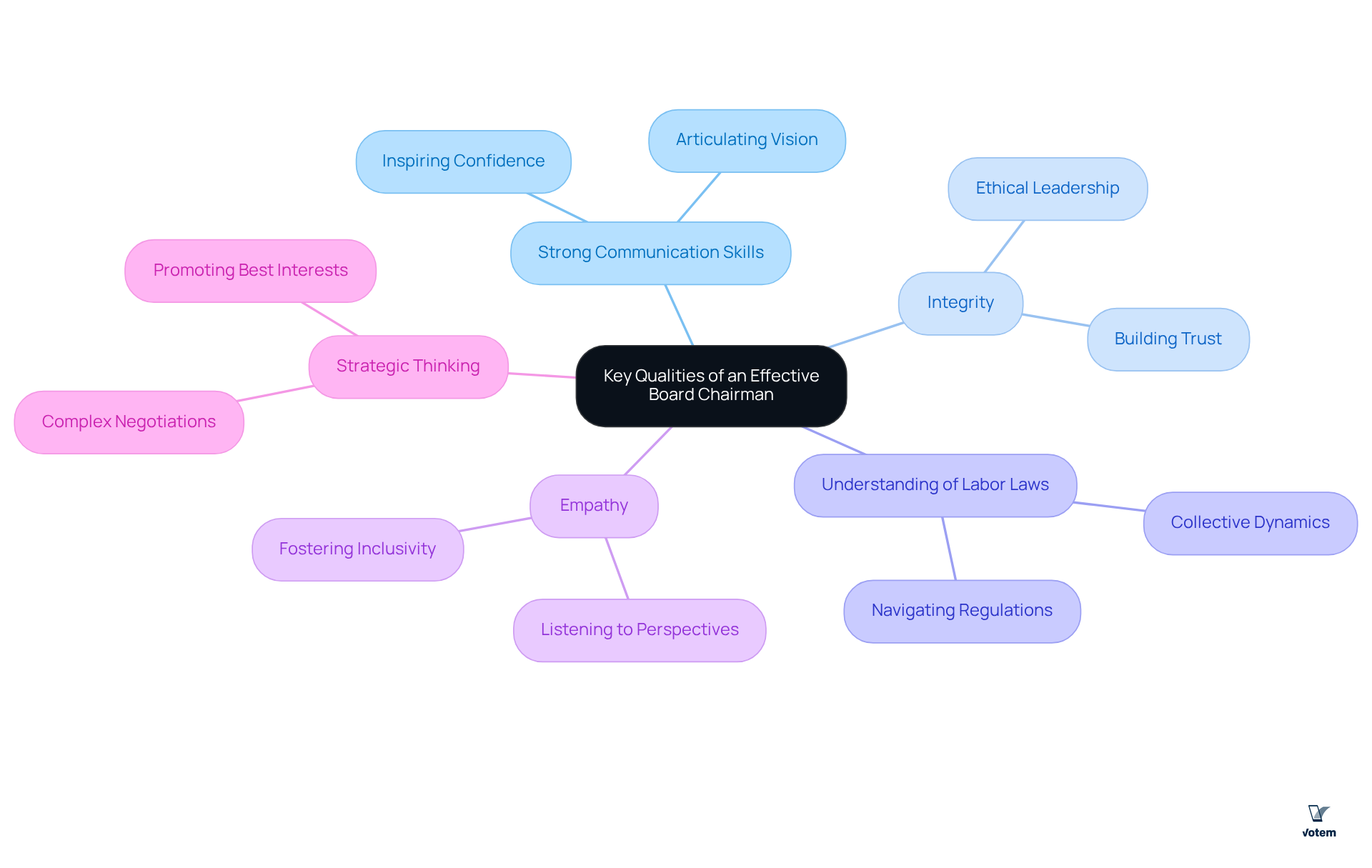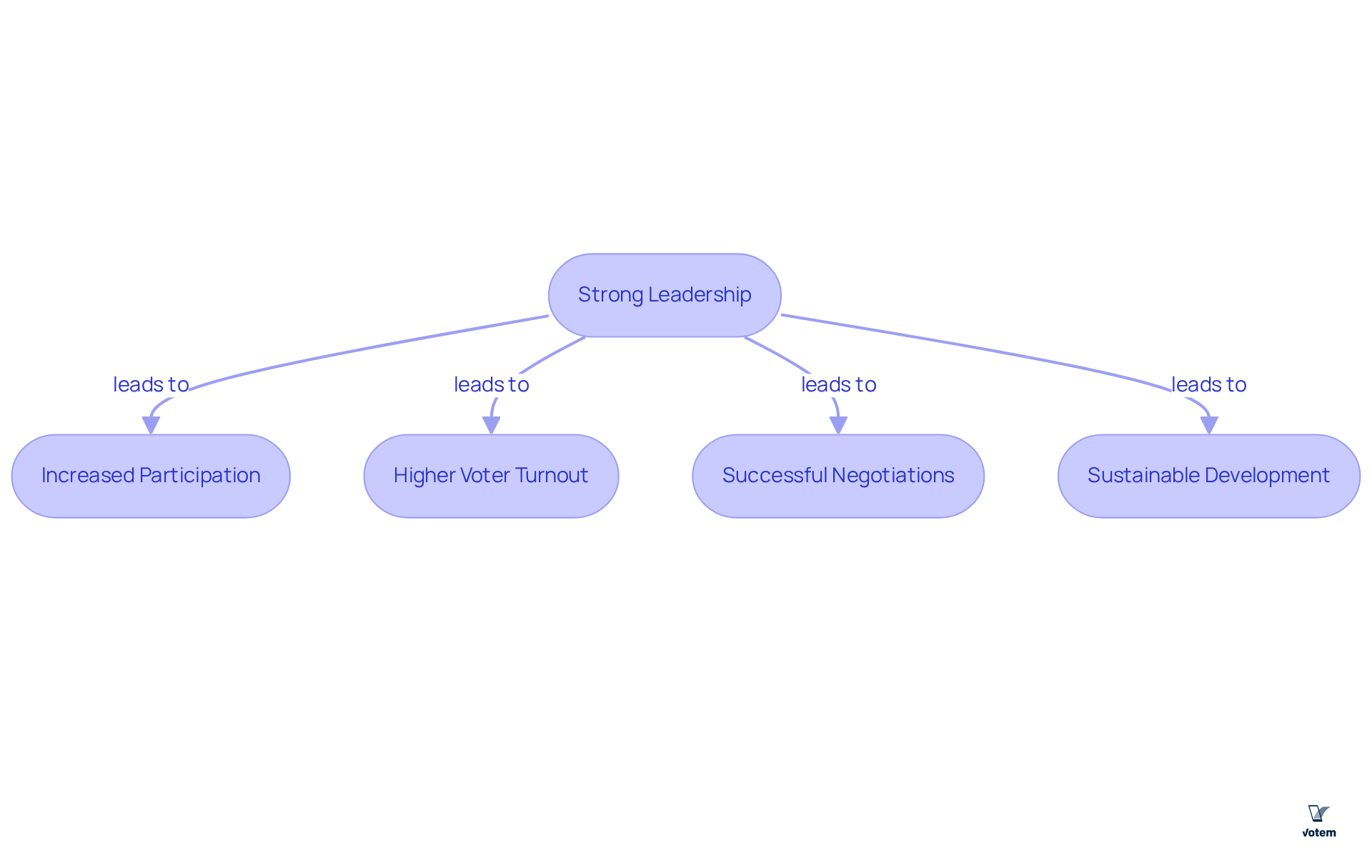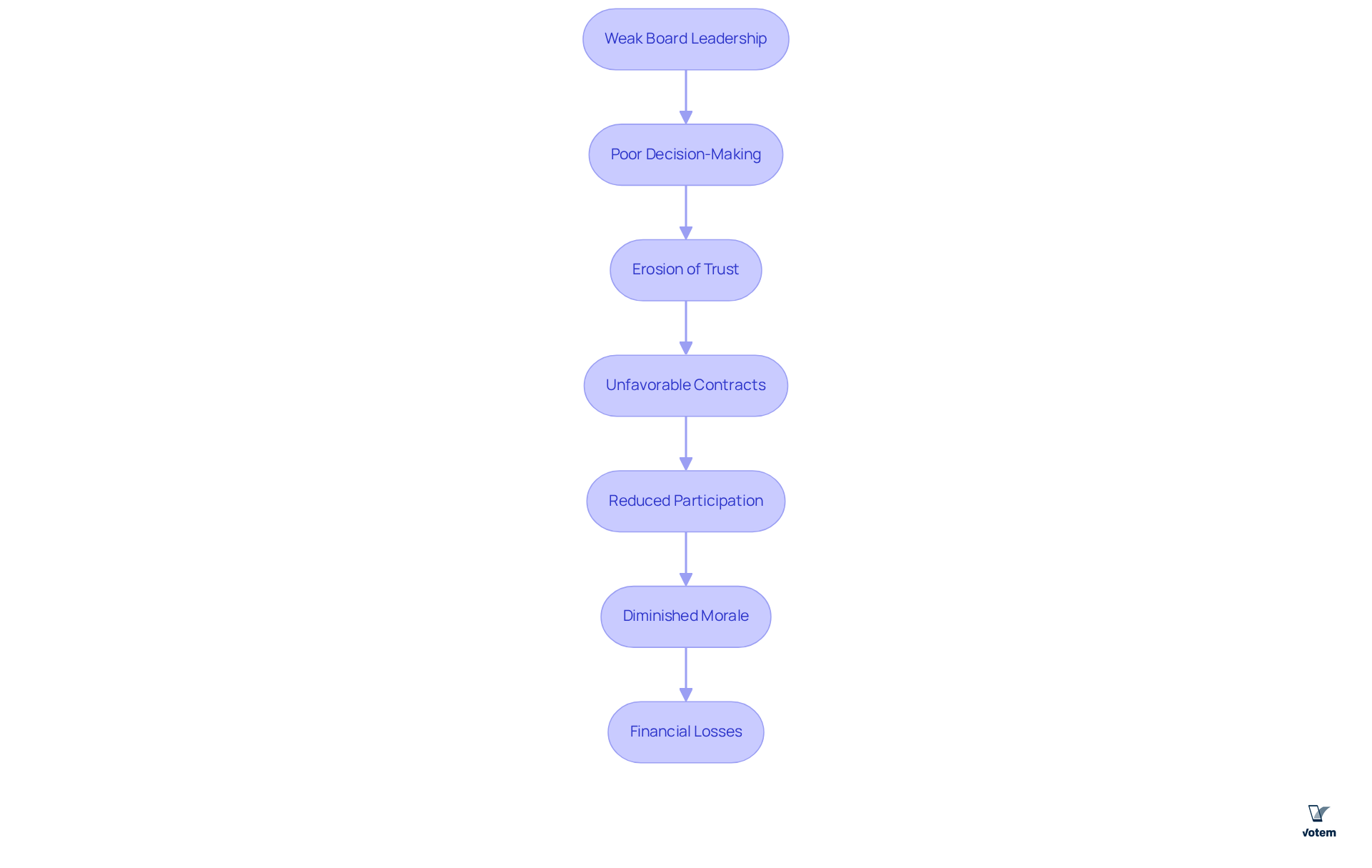Overview
The role of the board chairman is pivotal for the success of a union. By providing strategic leadership, facilitating communication, and ensuring that the organization’s mission aligns with the needs of its members, the chairman sets the foundation for effective governance. Furthermore, effective chairmen foster trust and engagement among members, which leads to higher participation rates and improved negotiation outcomes. Conversely, weak leadership can result in poor decision-making and diminished member satisfaction.
It is essential for union leaders to recognize that their leadership style directly impacts the union’s effectiveness. Engaging members through transparent communication and active involvement not only boosts morale but also enhances the overall functioning of the organization. In addition, statistics show that unions with strong leadership often achieve better results in negotiations. This highlights the necessity for chairmen to cultivate an environment where members feel valued and heard.
In conclusion, the success of a union hinges on the capabilities of its board chairman. By embracing strategic leadership and fostering member engagement, chairmen can navigate challenges effectively and drive their organizations towards success. Union leaders should reflect on their leadership practices and consider actionable strategies to enhance their impact, ensuring that they meet the evolving needs of their members.
Introduction
The role of a board chairman in unions is pivotal, serving as the linchpin that holds together the intricate dynamics of leadership and member engagement. By presiding over meetings and fostering an environment of trust and transparency, the chairman significantly influences the union’s success and effectiveness.
However, what occurs when this crucial position is occupied by someone lacking the necessary skills or commitment? The consequences can be dire, leading to poor decision-making and diminished member satisfaction.
This article delves into the essential qualities of an effective board chairman and explores the profound impact strong leadership has on union performance, revealing why this role is indispensable for achieving collective goals.
Define the Role of a Board Chairman in Unions
The Board President in an association is not merely a figurehead; they are the primary leader and representative, guiding the board’s strategic direction while ensuring that the organization’s mission aligns with its constituents’ needs. This role encompasses:
- Presiding over meetings
- Facilitating discussions
- Making pivotal decisions that shape the organization’s operations
Serving as a vital link between the board and representatives, the leader promotes transparency and cultivates trust—fundamentals for a healthy organizational environment. As Ken Green, Founder of UnionTrack, states, “Our power lies in our collective voice. Both parties understand that when labor groups are powerful, all employees benefit.” This underscores the significance of the Chairman’s role in involving participants and ensuring their voices are heard.
Their leadership establishes the atmosphere for the organization’s culture and priorities, influencing everything from negotiation tactics to participant engagement initiatives. For instance, effective Chairmen have been known to implement innovative communication strategies that significantly enhance member participation and satisfaction.
With rising from 61% in 2017 to 70% in 2024, the role of the board chairman becomes even more vital in nurturing this support. By understanding these responsibilities, we can truly recognize the profound influence a leader has on the organization’s overall effectiveness and success.

Identify Key Qualities of an Effective Board Chairman
An effective board chairman embodies several key qualities that are essential for success in union leadership. Strong communication skills, integrity, and a deep understanding of labor laws and collective dynamics are fundamental. A leader must articulate the organization’s vision clearly, inspiring confidence among members. Furthermore, empathy and the ability to listen to diverse perspectives foster an inclusive environment, which is crucial for collaboration.
Strategic thinking is another vital attribute, as the leader navigates complex negotiations while promoting the best interests of the organization. These qualities not only enhance the leader’s effectiveness but also contribute significantly to the overall well-being and success of the organization. In this context, it is imperative for the board chairman and union leadership to recognize the profound impact of these attributes on their ability to lead effectively.

Analyze the Impact of Strong Leadership on Union Success
Robust guidance within an association, especially from the board chairman, is essential for achieving organizational objectives. Effective leaders cultivate an environment of teamwork and trust, significantly enhancing involvement and participation in collective activities. For example, unions characterized by active guidance often experience markedly higher voter turnout rates during elections, as individuals feel a deeper connection and investment in the union’s direction. Statistics indicate that Votem’s mobile-first user experience can lead to a threefold increase in voter turnout on launch day, underscoring its importance in engaging participants.
Furthermore, efficient guidance not only improves immediate electoral results but also plays a crucial role in successful negotiations with employers, resulting in better contracts and working conditions for participants. The impact of robust guidance extends beyond immediate advantages, fostering lasting sustainability and development within the organization, ultimately reinforcing its position as a vital . In addition, union leadership must recognize the challenges they face and leverage these insights to drive effective strategies that not only meet current needs but also prepare for future demands.

Discuss Consequences of Weak Board Leadership
Weak board guidance can significantly undermine a union’s effectiveness and participant satisfaction. When the board chairman lacks essential skills or commitment, it often leads to and a lack of strategic direction. For instance, unproductive communication can result in misunderstandings and reduce transparency, eroding trust between management and individuals. This erosion of trust can hinder the organization’s negotiating power, culminating in unfavorable contracts and deteriorating working conditions. Studies indicate that inadequate management practices can lead organizations to lose as much as 7% of their overall yearly sales, underscoring the financial repercussions of ineffective governance, particularly within associations where participant satisfaction is paramount.
Furthermore, the repercussions of inadequate guidance extend beyond immediate negotiations. Over time, these issues can culminate in reduced participation and diminished morale, as individuals feel increasingly detached from their organization’s goals. A study revealed that only 30% of employees are actively committed to their jobs, with disengagement costing the U.S. economy approximately half a trillion dollars annually. This disengagement frequently stems from ineffective management, which can cultivate a detrimental atmosphere that suppresses participation and satisfaction.
The impact of inefficient board chairmen is particularly pronounced, as their performance directly influences the organization’s capacity to advocate for its members. As Michelle Eisen noted, employees often confront billion-dollar corporations with extensive resources, making strong guidance essential for successful negotiation. When decision-making is compromised, the organization’s mission and sustainability are jeopardized, requiring that groups seek strong guidance from the board chairman. As highlighted by specialists, effective guidance not only fosters a dedicated workforce but also enhances overall organizational performance, emphasizing the critical need for associations to invest in competent leaders who can adeptly navigate intricate labor environments. Moreover, successful mediation processes have demonstrated that strong leadership can significantly elevate member satisfaction and engagement, reinforcing the importance of effective governance in unions.

Conclusion
The pivotal role of a board chairman in union success cannot be overstated. This leadership position transcends mere meeting oversight; it embodies strategic guidance, the cultivation of trust, and the assurance that every member’s voice resonates. A strong chairman establishes the tone for the organization’s culture and priorities, ultimately shaping the union’s effectiveness in advocating for its members’ rights and needs.
Key qualities such as strong communication, integrity, empathy, and strategic thinking are essential for an effective board chairman. These attributes not only enhance the leader’s ability to navigate complex negotiations but also foster a collaborative environment that encourages member participation and satisfaction. The impact of robust leadership extends beyond immediate outcomes, influencing long-term sustainability and the overall health of the organization.
In light of these insights, it becomes clear that investing in competent leadership is crucial for unions aiming to thrive. The consequences of weak board leadership can be detrimental, leading to disengagement and poor decision-making that undermines the union’s mission. Therefore, it is imperative for unions to prioritize strong guidance and effective governance, as these elements are foundational to achieving their objectives and cultivating a committed workforce.
Frequently Asked Questions
What is the primary role of a Board Chairman in unions?
The primary role of a Board Chairman in unions is to be the main leader and representative, guiding the board’s strategic direction while ensuring the organization’s mission aligns with its constituents’ needs.
What are some specific responsibilities of a Board Chairman?
Specific responsibilities of a Board Chairman include presiding over meetings, facilitating discussions, and making pivotal decisions that shape the organization’s operations.
How does a Board Chairman promote transparency and trust within the organization?
A Board Chairman promotes transparency and trust by serving as a vital link between the board and representatives, fostering open communication and ensuring participants’ voices are heard.
Why is the role of the Board Chairman significant in the context of labor groups?
The role of the Board Chairman is significant because they help involve participants and ensure their collective voice is heard, which is essential for the power and effectiveness of labor groups.
How does the leadership of a Board Chairman influence the organization’s culture and priorities?
The leadership of a Board Chairman establishes the atmosphere for the organization’s culture and priorities, influencing aspects such as negotiation tactics and participant engagement initiatives.
What impact has public approval of labor organizations had on the role of Board Chairmen?
The increase in public approval of labor organizations, rising from 61% in 2017 to 70% in 2024, has made the role of the Board Chairman even more vital in nurturing this support and enhancing the organization’s effectiveness.
List of Sources
- Define the Role of a Board Chairman in Unions
- How the New Administration Could Impact U.S. Labor Unions – UnionTrack® (https://uniontrack.com/blog/how-the-new-administration-could-impact-u-s-labor-unions)
- Roles and Duties of Union Members and Leadership – Lesson | Study.com (https://study.com/academy/lesson/union-membership-types-of-members-purpose-effects.html)
- 16 million workers were unionized in 2024: Millions more want to join unions but couldn’t (https://epi.org/publication/millions-of-workers-millions-of-workers-want-to-join-unions-but-couldnt)
- From the Desk of Board Chair Bill Hall – SEIU Local 1000 (https://seiu1000.org/from-the-desk-of-board-chair-bill-hall-2)
- Union Members Summary
- 2024 A01 Results (https://bls.gov/news.release/union2.nr0.htm)
- Analyze the Impact of Strong Leadership on Union Success
- rsisinternational.org (https://rsisinternational.org/journals/ijriss/articles/unveiling-the-effectiveness-of-unions-a-study-from-the-perspective-of-union-members)
- The leadership dilemma: Examining the impact of strong leaders on parties (https://ejpr.onlinelibrary.wiley.com/doi/10.1111/1475-6765.12492)
- Discuss Consequences of Weak Board Leadership
- The TCM Group | London Borough of Newham Case Study (https://thetcmgroup.com/case_studies/london-borough-of-newham-case-study)
- 16 million workers were unionized in 2024: Millions more want to join unions but couldn’t (https://epi.org/publication/millions-of-workers-millions-of-workers-want-to-join-unions-but-couldnt)
- ‘Old-school union busting’: how US corporations are quashing the new wave of organizing (https://theguardian.com/us-news/2023/feb/26/amazon-trader-joes-starbucks-anti-union-measures)
- The High Cost of Poor Leadership – (https://stevenarmstrong.ca/uncategorized/the-high-cost-of-poor-leadership)
- Union Members Summary
- 2024 A01 Results (https://bls.gov/news.release/union2.nr0.htm)

